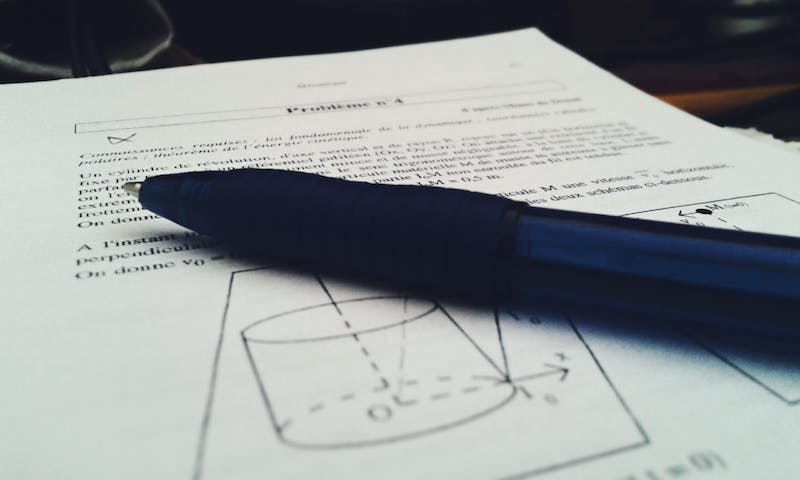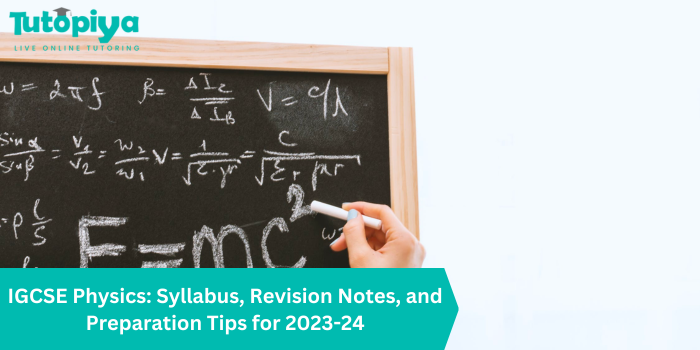Ace Your IGCSE Physics Exam with Expert Tips: Syllabus, Study Resources, and Past Papers
IGCSE Physics is a fascinating path into all aspects of physical science offered by Cambridge IGCSE Physics. It’s a topic that broadens your comprehension of the underlying ideas that govern the universe and gives you the tools necessary for a variety of potential careers. We’ll go more into the definition of IGCSE physics, its topics, and the advantages it provides for learners like you in this introduction.
Must Read – IGCSE Physics: Tips & Our Exclusive Cheat Sheet & Summary Notes
Overview of the IGCSE Physics Curriculum
The Cambridge IGCSE physics syllabus covers a wide range of topics to give students a strong foundation in the subject. It is a great option for those who want to become scientists or engineers because it provides a special combination of scientific knowledge and practical skills.
Benefits of studying IGCSE Physics
The IGCSE physics study provides advantages. It develops students’ logical thinking, problem-solving skills, and ability to analyze, in addition to giving them a thorough understanding of the physical world. It also creates pathways for higher education and employment in industries like research, engineering, and medicine.
Must Read – Acing IGCSE Physics: The 4 Simple Guidelines To Abide By
IGCSE Physics Notes and Syllabus Breakdown
Recognising the curriculum is crucial for achieving success. To help you understand the main ideas of the IGCSE Physics syllabus, let’s break it down.
- Motions, forces and energy
- Thermal physics
- Waves, light and sound
- Electricity and magnetism
- Nuclear physics
- Space physics
- Atomic physics
- General physics
- Alternative to practical
IGCSE Physics Key topics and their importance
- Understanding motions, forces, and energy is crucial to understanding how things move, interact, and transfer energy. This understanding serves as the foundation for an explanation of a variety of physical phenomena that occur in the universe.
- Understanding electricity and magnetism is essential for their use in daily life, business, and engineering. It forms the foundation of today’s technology, from electric circuits to electromagnetism.
- Waves, Light, and Sound: These subjects help us understand interaction, optics, and acoustics by helping us understand the properties of waves and how light and sound behave.
- Thermal Physics: Understanding thermal physics has implications for engineering, energy efficiency, and climate science as it enables us to clarify how temperature flows and the way atoms behave at different temperatures.
Must Read – IGCSE Physics Formula Sheet that will come in handy during your exam revision
Preparing for the IGCSE Physics Exam
Study tips and strategies
- Establish a study timetable: Divide up your study time into digestible chunks and dedicate each day to a different subject or topic.
- Make Use of Good Note-Taking: To make reviewing your notes easier, summarize important ideas and formulas.
- Work on previous papers: Previous exams are a great resource for learning about the format and nature of the questions. Use previous exams as regular practice to hone your time management and problem-solving abilities.
Learn – Tutopiya Physics Cheat Sheet + Summary Notes
Recommended study resources
- Video Guides: Several educational videos with physics lessons and explanations of important ideas can be found on websites like YouTube.
- Websites for IGCSE Physics Revision: IGCSE physics revision websites frequently offer study guides, notes, and practice exams. Tutopiya is the best platform for IGCSE Physics Revision.
- Flashcards: Make personalized flashcards or use apps on your phone to help you memorize definitions, equations, and other key terms.
- Simulations of Physics: You can increase your comprehension of complex physics phenomena by using interactive simulations to help you visualize them.
Access the Learning Platform
Understanding Core and Extended Levels
Differences between Core and Extended levels
- Core Level: Appropriate for students seeking a fundamental comprehension of chemistry.
- Extended Level: intended for students who want to learn more about the subject in depth.
Choosing the right level for you
By choosing the right level, you can make the most of your abilities and achieve your academic and professional objectives.

Solving IGCSE physics Past Papers
The importance of past papers
- Makes you familiar with the format of the exam.
- Assists in identifying your advantages and disadvantages.
- Improves your ability to manage your time.
Tips for effectively using past papers in your preparation
- To simulate exam conditions, set a timer.
- Examine your responses in detail.
- Determine typical question formats.
Challenges and Common Mistakes
Identifying common challenges students face
- Complex Concepts: If you’re unfamiliar with any of the complex ideas that are frequently included in physics, it may be difficult to understand them.
- Mathematical Concepts Application: Physics calls for a solid grasp of mathematics, which can be daunting for some students due to equations and calculations.
- Practical Labs: Because accurate and precise data collection is required, carrying out examinations and practical labs can be difficult.
IGCSE Physics: Tips for avoiding common Mistakes
- Begin Early: Start studying physics well in advance of the test to give yourself plenty of time to comprehend difficult ideas and practice solving problems.
- Break Down Difficult Concepts: Simplify difficult concepts into smaller, more doable components. Concentrate on one facet at a time to develop a thorough comprehension.
- Practice math: Since math is essential to physics, improve your math abilities. To solidify your foundation, practice algebra and calculations regularly.
- Participate Actively in Labs: Throughout practical labs, pay close attention, raise questions, and take thorough notes. Doing experiments is essential to learning physics.

IGCSE Physics Exam Day
Tips Last-minute preparation advice
- Proceed over the main ideas: Review key definitions, equations, and concepts before the test. Pay attention to subjects you find difficult or often forget.
- Complete a couple of past papers to acquaint yourself with the format of the exam and the kinds of questions that could be asked.
- Keep Things Organised: Make sure you have all the supplies you’ll need, such as proof of identity, stationery, and any tools or resources that are allowed.
Strategies for managing time during the exam
- Go through the instructions. Carefully: To ensure that you understand the paper’s format, any question choices, and the allotted time, start by carefully reading the instructions.
- Organize Time per Section: Allocate your time sensibly, devoting more time to the questions or sections that you are most confident in answering.
- Manage the Easiest First: To improve your confidence and score quickly, begin with the questions that seem the easiest.
Useful Online Resources for IGCSE physics
Tutopiya’s learning platform offers tailored IGCSE Physics notes, IGCSE Physics revision, IGCSE Physics past papers, IGCSE Physics quizzes, and a wide range of other subjects. We provide qualified tutors who can help you with your needs and problems. Tutoring classes can be booked at your leisure and provide concentrated and personalized assistance.
IGCSE physics for Homeschoolers
Tutopiya’s learning platform includes a comprehensive IGCSE Physics syllabus, IGCSE Physics lesson notes and IGCSE Physics previous papers and quizzes.
Future Pathways: Beyond IGCSE physics
A successful IGCSE in physics offers an infinite amount of opportunities for career and further study. This course equips you with the fundamental knowledge and analytical skills required for advanced study in physics, engineering, and other fields associated with science as you go along. Access to numerous career options is made possible by it, including those in technology, ecology, healthcare, and development and research.
Teacher and Parental Involvement
The participation of teachers and parents has a significant impact on the academic achievement of IGCSE Physics students. Providing students with individualized support, practical experiences, and top-notch instruction can aid them in comprehending complex physics concepts. Parents are essential in the interim because they foster a supportive environment for learning at home, encourage a child’s curiosity, and actively engage in physics-related discussions.
IGCSE Physics: FAQs
Q: How to study for IGCSE physics?
A: To prepare for the IGCSE Physics exam, make a well-organized study schedule, practice with previous exams, and ask teachers or use online resources for assistance when needed
Q: What are the benefits of taking Cambridge IGCSE physics?
A: It offers a solid foundation in science, develops critical thinking abilities, and provides opportunities for a variety of job options.
Q: What are the passing grades for Cambridge IGCSE physics?
A: A: A*, A, B, C, D, E, F, and G are the grade levels in IGCSE Physics , with A* representing the highest possible grade and G being the lowest
Q: How long is the Cambridge IGCSE physics examination?
A: paper 1 MCQ ( 1 hour) , Paper 2 Practical,( 1 hour and 30 minutes ) and paper 3 alternative to practical (1 hour ).
Q: How to prepare for IGCSE physics Examination
A:To get ready, go over the syllabus in detail, practice with previous exams, and ask teachers or peers for assistance when necessary.
Q: How do I get my Cambridge IGCSE physics results?
A:The dates and access to your results will be announced by your school or testing facility. You can view your results on the Cambridge Assessment website.
